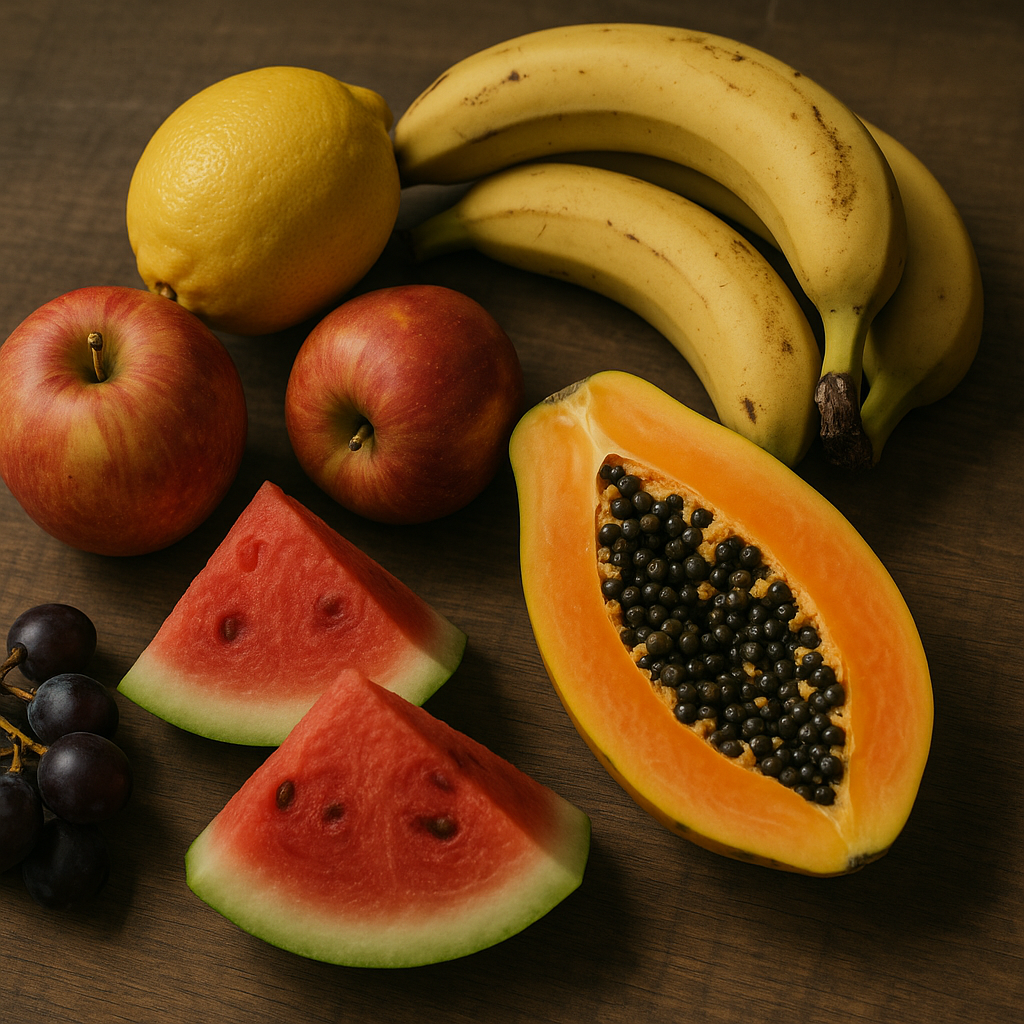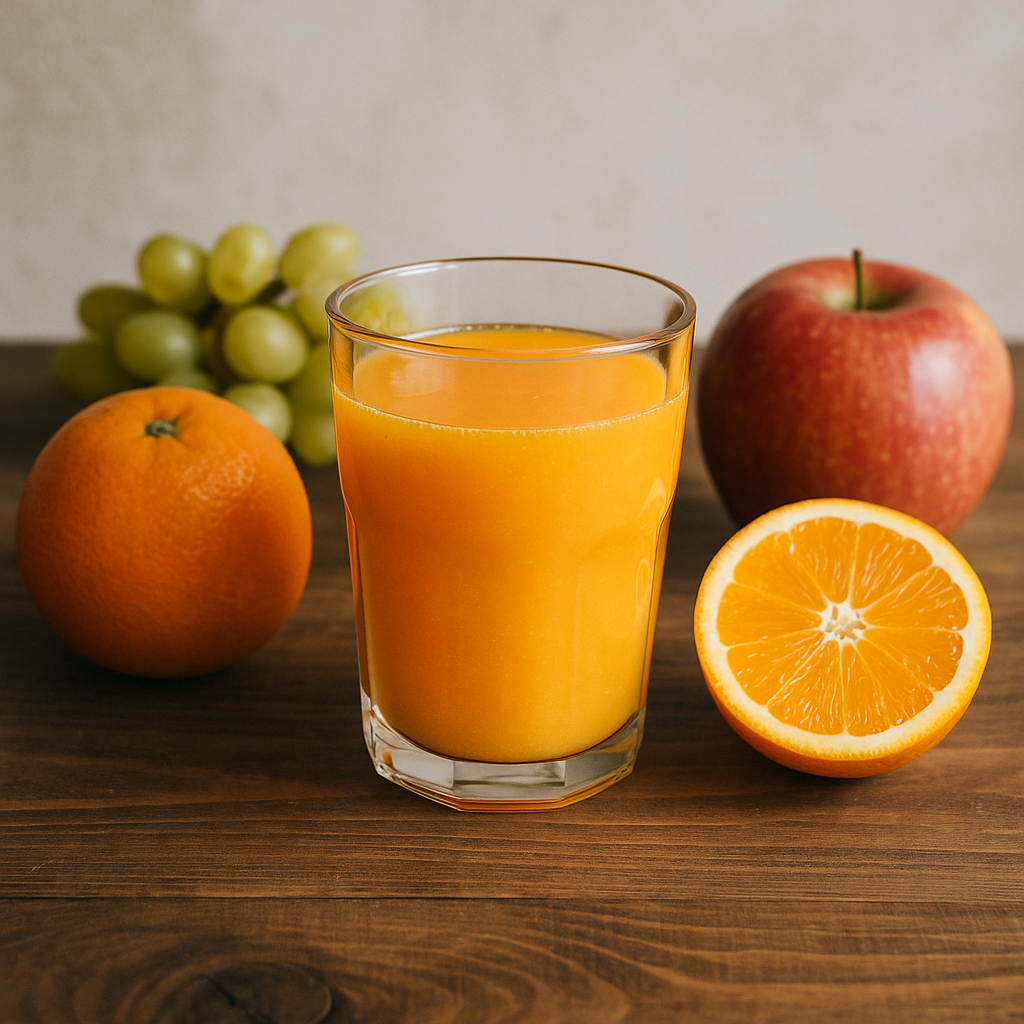आयुर्वेदिक डॉक्टर से प्रश्न पूछें और निःशुल्क या भुगतान मोड में अपनी चिंता की समस्या पर ऑनलाइन परामर्श प्राप्त करें। 2,000 से अधिक अनुभवी डॉक्टर हमारी साइट पर काम करते हैं और आपके प्रश्नों का इंतजार करते हैं और उपयोगकर्ताओं को उनकी स्वास्थ्य समस्याओं को हल करने में प्रतिदिन मदद करते हैं।
कौन सा फल बवासीर के लिए अच्छा नहीं है: क्या न खाएं और क्या खाएं

बवासीर से निपटना—जिसे हेमोरॉयड्स भी कहा जाता है—कोई डिनर टेबल पर चर्चा करने वाला विषय नहीं है, लेकिन यह लाखों लोगों को प्रभावित करता है और दैनिक जीवन को गंभीर रूप से प्रभावित कर सकता है। अगर आप सोच रहे हैं कि कौन सा फल बवासीर के लिए अच्छा नहीं है, या कौन सा फल अच्छा है और वास्तव में लक्षणों को शांत करने में मदद कर सकता है, तो आप सही जगह पर हैं। चाहे आप राहत की तलाश में हों या बस फ्लेयर-अप्स को रोकना चाहते हों, आहार की भूमिका—खासकर फलों की—समझना महत्वपूर्ण है।
कुछ फल बवासीर के दौरान आपके सबसे अच्छे दोस्त होते हैं, जो फाइबर, हाइड्रेशन और एंटी-इंफ्लेमेटरी लाभ प्रदान करते हैं। और कुछ? इतना नहीं। वास्तव में, कुछ फल पाचन तंत्र को परेशान करके या सूजन, गैस और असुविधा पैदा करके चीजों को और खराब कर सकते हैं। तो चलिए भ्रम को दूर करते हैं: यह गाइड कवर करता है बवासीर के लिए सबसे अच्छा फल, बवासीर राहत के लिए फल, कौन सा फलों का रस बवासीर के लिए अच्छा है, और हां—कौन सा फल बवासीर के लिए अच्छा नहीं है (आप सच में जानना चाहते हैं)। चलिए शुरू करते हैं।

कौन सा फल बवासीर के लिए अच्छा नहीं है और क्यों
बवासीर में बेहतर पाचन के लिए बचने वाले फल
चलो बुरी खबर से शुरू करते हैं। जबकि फल आमतौर पर स्वस्थ होते हैं, सभी फल बवासीर के दौरान अच्छे नहीं होते। कुछ लक्षणों को बढ़ा सकते हैं, सूजन पैदा कर सकते हैं, या कब्ज का कारण बन सकते हैं (और जब आप पहले से ही दर्द में हैं तो यह आखिरी चीज है जो आप चाहते हैं)।
तो, कौन सा फल बवासीर के लिए अच्छा नहीं है?
-
कच्चे केले – हां, केले आमतौर पर एक पसंदीदा होते हैं, लेकिन कच्चे केले स्टार्चयुक्त और फाइबर में कम होते हैं। वे कब्ज का कारण बन सकते हैं, जो बवासीर को ट्रिगर या बढ़ा सकता है। अगर आपको केले खाने ही हैं तो पके हुए खाएं।
-
पर्सिमन्स – टैनिन्स में उच्च, पर्सिमन्स पाचन को धीमा कर सकते हैं और मल को कठोर और सूखा बना सकते हैं।
-
बीज के साथ अमरूद – अमरूद फाइबरयुक्त है, हां, लेकिन बीज आपके सिस्टम पर कठोर हो सकते हैं और आपकी आंत की परत को परेशान कर सकते हैं, खासकर अगर आपके पास आंतरिक हेमोरॉयड्स हैं।
-
प्रिजर्वेटिव्स के साथ सूखे फल – मीठे सूखे अनानास या पैकेज्ड सूखे खुबानी के बारे में सोचें। इनमें अक्सर सल्फाइट्स होते हैं जो आपकी आंत को परेशान कर सकते हैं।
-
अधिक मात्रा में खट्टे फल – वे "बुरे" नहीं हैं, लेकिन बहुत अधिक खट्टे फल पेट के एसिड को बढ़ा सकते हैं और अगर आप पहले से ही सूजन में हैं तो गुदा की परत को परेशान कर सकते हैं।
तो अगर आप सोच रहे हैं "बवासीर में बचने वाले फल", अब आप जानते हैं। यह इन फलों को पूरी तरह से काटने के बारे में नहीं है, लेकिन उन्हें सीमित करना समझदारी है—खासकर फ्लेयर-अप्स के दौरान।
कैसे कुछ फल बवासीर के लक्षणों को ट्रिगर कर सकते हैं
कम फाइबर, उच्च चीनी, या अम्लता वाले फल आपके पेट को परेशान कर सकते हैं। उदाहरण के लिए, अतिरिक्त चीनी के साथ लोड किए गए फलों के रस। वे स्वस्थ लगते हैं लेकिन रक्त शर्करा को बढ़ाते हैं, सूजन का कारण बनते हैं, और फाइबर की कमी होती है जो आपके मल को नरम रखने में मदद करता है।
अधिक मात्रा में फ्रुक्टोज (जैसे बहुत अधिक अंगूर या सेब से) भी कुछ लोगों में सूजन या गैस का कारण बन सकता है, जिससे निचले पेट में दबाव होता है—हां, इसका मतलब है आपके बवासीर पर दबाव।
एक और कम स्पष्ट ट्रिगर? बिना पर्याप्त पानी के बड़ी मात्रा में खाए गए फल। फाइबर को काम करने के लिए पानी की जरूरत होती है। अन्यथा, आप कठोर मल और और भी अधिक असुविधा के साथ समाप्त हो सकते हैं। यह केवल बवासीर के उपचार के लिए सबसे अच्छे फल के बारे में नहीं है, बल्कि कैसे और कब आप उन्हें खाते हैं।

स्वयं दवा न लें और प्रतीक्षा न करें। अभी डॉक्टर से चैट शुरू करें
कौन सा फल बवासीर के लिए अच्छा है और राहत प्रदान करता है
अब जब हमने बचने वाले फलों को कवर कर लिया है, तो चलिए शो के सितारों के बारे में बात करते हैं—फल जो वास्तव में मदद करते हैं। अगर आप "कौन सा फल बवासीर के लिए अच्छा है" को गूगल पर 3 बजे टाइप कर रहे हैं, तो यहां आपका जवाब है।
प्राकृतिक रूप से बवासीर के उपचार के लिए सबसे अच्छा फल
जब मल को नरम करने, सूजन को कम करने और पाचन में सुधार करने की बात आती है, तो कुछ फल वास्तव में अपना वजन खींचते हैं। यहां बवासीर के उपचार के लिए सबसे अच्छे फल की सूची है:
-
पके केले – जब पूरी तरह से पके होते हैं, तो केले पचाने में आसान होते हैं और मल को नरम बनाते हुए उसे भारी बनाते हैं। वे अधिकांश बवासीर-फ्रेंडली आहारों में एक मुख्य हैं।
-
पपीता – ओह हां। यह उष्णकटिबंधीय फल एक प्राकृतिक पाचन सहायक है, पपैन नामक एक एंजाइम के लिए धन्यवाद। यह प्रोटीन को तोड़ने में मदद करता है और मल त्याग को आसान बनाता है।
-
बेरीज (जैसे ब्लूबेरी और स्ट्रॉबेरी) – वे फाइबर और एंटीऑक्सीडेंट्स में समृद्ध होते हैं, जो उपचार का समर्थन कर सकते हैं और हेमोरॉयड्स के आसपास सूजन को कम कर सकते हैं।
-
नाशपाती – फाइबर में सुपर हाई, खासकर अगर आप त्वचा खाते हैं। वहां चीजों को चलते रहने के लिए बढ़िया।
-
सेब – त्वचा के साथ, सेब घुलनशील और अघुलनशील फाइबर प्रदान करते हैं, जो मल त्याग को नियमित करने में मदद करते हैं। बस इसे ज़्यादा न करें अगर सेब आपको गैसी बनाते हैं।
-
अंजीर – ताजा या भिगोए हुए सूखे अंजीर बवासीर के रोगियों के लिए उत्कृष्ट हैं। वे फाइबर में समृद्ध हैं और एक कोमल रेचक के रूप में कार्य करते हैं।
तो अगर आप सोच रहे हैं बवासीर के लिए सबसे अच्छा फल कौन सा है, तो ये वही हैं जिन्हें आपको चुनना चाहिए। बस याद रखें कि उन्हें पर्याप्त पानी के साथ जोड़ें।
आयुर्वेद के अनुसार बवासीर के लिए सबसे अच्छा फल कौन सा है
आयुर्वेद, प्राचीन भारतीय चिकित्सा प्रणाली, का अपना दृष्टिकोण है कि बवासीर के लिए सबसे अच्छा फल कौन सा है। आयुर्वेदिक चिकित्सकों के अनुसार, ठंडे, हाइड्रेटिंग और फाइबर-समृद्ध गुणों वाले फल सबसे फायदेमंद होते हैं।
-
बेल फल (जिसे लकड़ी का सेब भी कहा जाता है): परंपरागत रूप से कोलन को साफ करने और कब्ज को आसान बनाने के लिए उपयोग किया जाता है।
-
काले किशमिश: रात भर भिगोने पर, ये मल त्याग में सुधार करते हैं और शौच के दौरान दबाव को कम करते हैं।
-
आंवला (भारतीय करौदा): विटामिन सी और एंटीऑक्सीडेंट्स में उच्च, यह सूजन को कम करने में मदद करता है और ऊतक उपचार का समर्थन करता है।
आयुर्वेद भी फ्लेयर-अप्स के दौरान बहुत अधिक "गर्म" या अम्लीय फलों को खाने के खिलाफ सलाह देता है—इसलिए फिर से, संयम महत्वपूर्ण है।
कौन सा फलों का रस बवासीर और हेमोरॉयड्स के लिए अच्छा है
फलों का रस आपके आहार में एक सुखदायक जोड़ हो सकता है—अगर आप सही चुनते हैं। तो, कौन सा फलों का रस बवासीर के लिए अच्छा है?
-
प्रून जूस: कब्ज के लिए एक क्लासिक उपाय। सुबह में सिर्फ आधा गिलास चीजों को स्वाभाविक रूप से चलाने में मदद कर सकता है।
-
एलोवेरा और सेब का रस मिश्रण: यह संयोजन पाचन तंत्र के लिए ठंडा और सुखदायक है।
-
अनार का रस: थोड़ा कसैला लेकिन एंटीऑक्सीडेंट्स और फाइबर में समृद्ध। उपचार और पाचन में सुधार के लिए बढ़िया।
-
पपीता का रस: बनाना आसान है, और मल को नरम करने के लिए बढ़िया।
बस याद रखें: बवासीर के लिए सबसे अच्छा फलों का रस हमेशा 100% प्राकृतिक, बिना चीनी के, और आदर्श रूप से घर का बना होता है। एडिटिव्स के साथ स्टोर से खरीदे गए रस? आपके दोस्त नहीं हैं।

आहार टिप्स: बवासीर की रोकथाम और उपचार के लिए फल
फल खाना बवासीर को प्रबंधित करने की दिशा में एक शक्तिशाली कदम है, लेकिन यह कुछ स्मार्ट जीवनशैली और आहार परिवर्तनों के साथ सबसे अच्छा काम करता है। यहां बताया गया है कि कैसे सिर्फ "कौन सा फल बवासीर के लिए अच्छा है" पूछने से आगे बढ़कर उस जानकारी का उपयोग करके हर दिन बेहतर महसूस किया जा सकता है।
घर पर बवासीर राहत के लिए सबसे अच्छा फलों का रस
आपको फैंसी सप्लीमेंट्स या महंगे जूस की जरूरत नहीं है। वास्तव में, बवासीर के लिए सबसे अच्छा फलों का रस शायद पहले से ही आपके किचन में है। यहां कुछ घर-फ्रेंडली विकल्प हैं:
-
भिगोए हुए अंजीर का पानी: 2-3 सूखे अंजीर को रात भर पानी में भिगो दें। सुबह पानी पिएं और अंजीर खाएं। यह एक कोमल प्राकृतिक रेचक है।
-
ताजा संतरे का रस गूदे के साथ: हाइड्रेशन और फाइबर (अगर आप गूदा शामिल करते हैं!) प्रदान करता है। चीजों को नरम और नियमित रखने में मदद करता है।
-
तरबूज का रस: हाइड्रेटिंग, ठंडा, और गर्मियों में बढ़िया जब निर्जलीकरण कब्ज को ट्रिगर कर सकता है।
-
आंवला का रस: इसके उपचार और एंटी-इंफ्लेमेटरी लाभों के लिए जाना जाता है। यह थोड़ा खट्टा हो सकता है, इसलिए जरूरत पड़ने पर इसे शहद या किसी अन्य रस के साथ मिलाएं।
सुनिश्चित करें कि आप इन्हें ताजा पी रहे हैं—बॉक्स से चीनी से लोडेड चीजें नहीं। अगर आप बवासीर की रोकथाम के लिए फल का उपयोग करने के बारे में गंभीर हैं, तो प्रकृति के करीब रहें।
फल विकल्पों के साथ संतुलित आहार और जीवनशैली
आइए वास्तविक बनें—केवल फल आपको बवासीर से नहीं बचाएंगे अगर आपका बाकी आहार बेकार है। यहां और क्या ध्यान में रखना है:
-
हाइड्रेटेड रहें. फाइबर बिना पानी के = कठोर मल। मजेदार नहीं।
-
नियमित रूप से व्यायाम करें. यहां तक कि 20 मिनट की सैर भी आपके पाचन तंत्र में मदद करती है।
-
तनाव से बचें. अगर आप मल त्याग के दौरान जोर लगा रहे हैं, तो आप चीजों को और खराब कर रहे हैं।
-
अपने भोजन में साबुत अनाज, सब्जियां और फलियां जोड़ें ताकि फाइबर की पूरी मात्रा मिल सके।
-
प्रोसेस्ड फूड्स, कैफीन, और अल्कोहल को कम करें। (हां, उबाऊ सलाह... लेकिन यह काम करती है।)
इन आदतों को सही फल सेवन के साथ मिलाएं और आप लंबे समय तक राहत के लिए खुद को तैयार कर रहे हैं।
निष्कर्ष
तो, अब आप जानते हैं कौन सा फल बवासीर के लिए अच्छा नहीं है, और सबसे महत्वपूर्ण, कौन से अच्छे हैं। जबकि यह एक मामूली आहार परिवर्तन की तरह लग सकता है, सही फलों—और रसों—को चुनना वास्तव में लक्षणों को कम करने और भविष्य के फ्लेयर-अप्स को रोकने में मदद कर सकता है। बवासीर के लिए सबसे अच्छा फल वह है जो फाइबर में समृद्ध है, पचाने में आसान है, और उपचार और रोकथाम की दिशा में एक बड़े जीवनशैली बदलाव का हिस्सा है।
मत भूलें: अपने शरीर को सुनें, हाइड्रेटेड रहें, और केवल फलों पर निर्भर न रहें—बवासीर के लिए एक पूरे शरीर का दृष्टिकोण आवश्यक है। इन सुझावों में से कुछ को आजमाएं, और इस लेख को किसी और के साथ साझा करें जो उसी चीज से निपट रहा है। आप कभी नहीं जानते कि किसे इसकी जरूरत है।
अक्सर पूछे जाने वाले प्रश्न
क्या केला बवासीर के लिए अच्छा या बुरा है?
पके केले अच्छे हैं—वे पेट पर कोमल होते हैं और मल त्याग को नियमित करने में मदद करते हैं। लेकिन कच्चे केले? इतना नहीं। वे आपको कब्ज कर सकते हैं, इसलिए फ्लेयर-अप के दौरान उनसे बचें।
बवासीर में सूजन को कम करने के लिए कौन सा फल सबसे अच्छा है?
पपीता, बेरीज, और आंवला (भारतीय करौदा) जैसे फल सूजन को कम करने के लिए बहुत अच्छे हैं। वे एंटीऑक्सीडेंट्स में समृद्ध हैं और पचाने में आसान हैं।
क्या खट्टे फल बवासीर के लक्षणों को खराब कर सकते हैं?
हां, कुछ मामलों में। जबकि खट्टे फल विटामिन सी में उच्च होते हैं, बहुत अधिक खाने से—खासकर खाली पेट—आंत को परेशान कर सकते हैं और बवासीर के दर्द या खुजली को बढ़ा सकते हैं।
क्या सूखे फल बवासीर होने पर सुरक्षित हैं?
हां और नहीं। प्राकृतिक सूखे फल जैसे किशमिश और अंजीर (खासकर भिगोए हुए) मददगार हो सकते हैं। लेकिन प्रोसेस्ड या मीठे सूखे फलों में अक्सर प्रिजर्वेटिव्स और अतिरिक्त चीनी होती है जो आपके सिस्टम को परेशान कर सकती है।
क्या आप अपने स्वास्थ्य को नियंत्रित करने के लिए तैयार हैं?
इस लेख को एक दोस्त के साथ साझा करें, इसे बाद के लिए बुकमार्क करें, और आज ही अपनी बवासीर-फ्रेंडली डाइट बनाना शुरू करें। छोटे कदम = बड़ी राहत।

